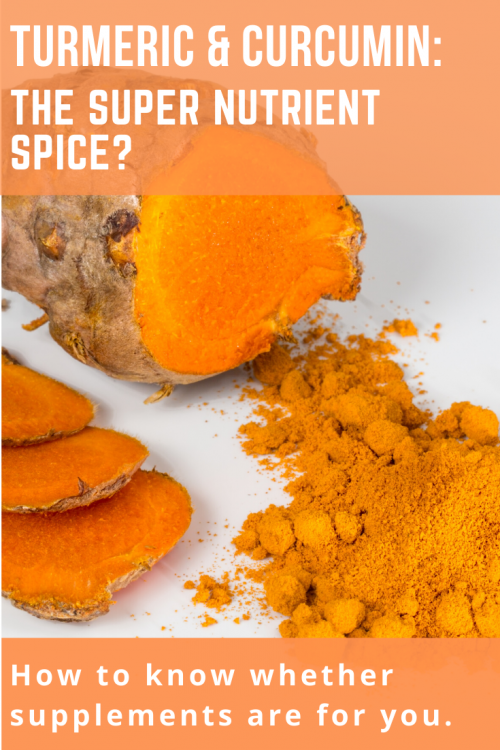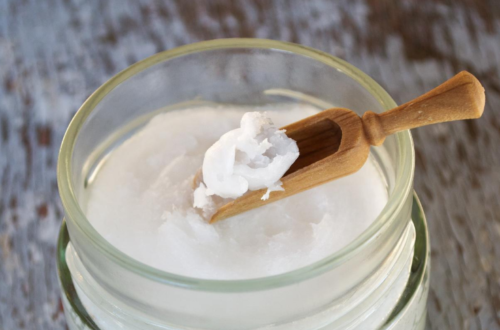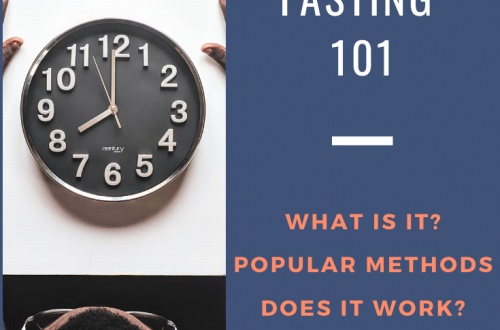
Turmeric and Curcumin: The Super Nutrient Spice?
How to know whether turmeric supplements are for you.
If you live near a Natural Grocers (NG) health food store, you may be familiar with their regular publication, the “good4u Health Hotline Magazine”. This is a legit magazine that is part sales flyer, but also includes nutrition articles, recipes, and store events. I really get into reading these, especially the nutrition articles. They vary from the typical – “eat more organic vegetables” – to the obscure – “methylation adaptogens to restore methylation balance”. (What?! I’ll have to do some research on that one!)
The January edition of good4u Health Hotline included the eye-catching article “Natural Grocers Top 10 Trends for 2020”. In scanning this article, the #2 trend – “Foundational Supplements to Help Us Thrive” – made me stop for a closer look. NG calls these by the catchy moniker, Five-To-Thrive Foundational Supplements.
First, I’m wary of any kind of supplement-peddling, because I think humans should be able to get nutrition through actual food and only use supplements in unique circumstances. Second, NG has a giant supplement sales department, so I sense a conflict of interest here.
The Five-To-Thrive supplements Natural Grocers recommends are:
- Multivitamin
- Omega-3 (DHA and EPA)
- Lutein
- Magnesium
- Super Nutrients, which include turmeric, milk thistle, mushroom supplements, CoQ10, berberine, grape seed extract, beets, and greens.
This list is followed by, “Not sure which super nutrient is best for you? Reach out to a Nutritional Health Coach (NHC) at Natural Grocers for some guidance.”
Hmm. It sounds like NG is recommending that, if I’m not a supplement expert, I go talk to a supplement salesperson to find out which ones I should buy. I’m suspicious.
It’s worth noting that NG’s NHCs are required to have a degree/certification in nutrition or a related field (e.g., dietetics, BS or MS in biology, biochemistry, naturopathy) from an accredited college or university; plus complete annual continuing education. So, I don’t think that NHCs are hacks or not qualified – in fact, they are likely more educated than many “health coaches” or “nutritionists” out there.
Back to Five-To-Thrive.
The first four on the list – multivitamin, omega-3s, lutein, and magnesium are typical, if not entirely necessary, recommendations. You’ve probably heard of, and may even already take, some of these.
Super Nutrients?

What really caught my eye was #5 – Super Nutrients. The caped green guy at right is the kind of visual image that popped into my head. I mean, what the heck is a super nutrient anyway?
Super Nutrient: any of various dietary supplements containing strong concentrations of vitamins and other substances designed to remedy nutrient deficiencies in the body.
Collins English Dictionary
That’s an enigmatic definition. Is it a supplement, a food, a compound within a food/supplement? The answer seems to depend on the context. For the purpose of this post, a super nutrient will be thought of as the latter – compound within a food or supplement. Examples that you may have heard of: beta carotene (orange vegetables), capsaicin (chili peppers), curcumin (turmeric).
Furthermore, super nutrients, in this context, are generally ingested as a concentrate/supplement, (eg, as a pill, powder, or tincture); because it is difficult to eat enough of these nutrients – as they exist in food – to get an effective dose.
Turmeric = Super Nutrient?
I’d like to focus on super nutrient turmeric for a couple of reasons.
- I’ve been seeing turmeric in everything from lattes to pills to baked goods. No more is turmeric relegated to the one curry dish you know – it’s everywhere.
- I think turmeric – by itself and in high concentrations – is nasty. To me, it tastes like rancid dirt. Like some other spices (cardamom, I’m looking at you), it is best as a complement or undertone to other flavors.
The big question is: What is so great about turmeric that people are willing to pay extra for it, even if it tastes weird?
I will attempt to answer, based on my own experiences, biases, and research.
First, Turmeric has been recognized for its medicinal properties for thousands of years.
A perennial plant of the ginger family, turmeric contains the polyphenol curcumin, which is now recognized as the source of turmeric’s health benefits. Many research studies have been conducted to measure and/or prove what Asian cultures have observed for millenia: that turmeric has antioxidant, anti-inflammatory, antimutagenic, antimicrobial, and anticancer properties. Wow – sounds great!!
Keep in mind that many of the anti- adjectives listed above have considerable overlap. For example, oxidative damage, inflammation, and cell mutations all contribute to various cancers.
Second, Turmeric’s polyphenol compound curcumin does decrease and/or reverse inflammation and other disease pathways.
In the graphic below, Aggarwal and Harikumar show how many pro-inflammatory conditions – everything from leukemia to wound healing – have shown improvement after treatment with curcumin.

Aggarwal, Bharat B., and Kuzhuvelil B. Harikumar. “Potential Therapeutic Effects of Curcumin, the Anti-Inflammatory Agent, against Neurodegenerative, Cardiovascular, Pulmonary, Metabolic, Autoimmune and Neoplastic Diseases.” The International Journal of Biochemistry & Cell Biology, vol. 41, no. 1, 2009, pp. 40–59.
Curcumin and its specific roles in multiple physiological and biochemical pathways that impact disease are beyond the scope of this blog article. In summary, curcumin’s ability to modulate multiple cell signaling pathways is what makes it such a valuable compound for human health.
If you want to dig into the deep physiology of curcumin’s effects, I’ve listed several journal articles below to get you started. I found the following quote from Gupta, et al. sums up the historical and current perception of turmeric/curcumin:
“How a single agent can possess these diverse effects has been an enigma over the years, both for basic scientists and clinicians. However, numerous lines of evidence have indicated curcumin’s ability in human participants to modulate multiple cell signaling molecules …”
Gupta, et al.
Thirdly, turmeric/curcumin is safe.
The literature unanimously states that curcumin has a well established safety record. Here are the general recommendations I’ve found for supplement dosage, duration, etc. :
- The World Health Organization (WHO) suggests an allowable daily intake (ADI) of 3 mg/kg of body weight.
- Most supplements come in pill form, with 500 mg of curcumin in each pill (some with added compounds for bioavailability, some not).
- Dosage recommendations range from 500 mg/day for “wellness” to 3000 mg/day for “therapeutic” purposes.
However, curcumin alone is poorly absorbed in the body, and scientists disagree on its effectiveness.
- Curcumin ingested by itself has very poor absorption and bioavailability. Formulations on the market vary widely in absorption rates, and after a little research, I haven’t found a reliable source of information on the most bioavailable curcumin supplements (Please post in comments if you know!).
- Furthermore, many scientists are extremely suspect on the actual efficacy of curcumin, due to its low bioavailability (~1%) and extremely short half-life.
This is a big dual-caveat for me – I hate wasting money and being duped by incomplete research and marketing.
If I start supplementing with curcumin, I’ll post an update here on the results (if any). I could always use some anti-inflammation in my joints and muscles.
Lastly, beware of overpriced turmeric-infused products.
My friends, stay diligent in filtering out the turmeric hype and beware of “inflammation-washing”. Example: an “Anti-Inflammation Turmeric Smoothie” that contains 50 grams of sugar and a dash of turmeric. That hit of sugar will more than cancel out any anti-inflammatory impact from the sprinkle turmeric.
Unless it’s in a well-formulated supplement or some very generously spiced curry, the turmeric that you ingest from food will likely go straight through you and have zero impact.
I’d love to hear your opinions and experiences with turmeric and/or curcumin, especially if you have any delicious recipes! Thanks for reading – if you found this informative, interesting, or have questions, please post in the comments below!
Update: After 30 days of supplementation
I bought a 30-day supply of turmeric curcumin supplements, which provided 1500 mg curcumin per day (for 3 capsules).
Admittedly, I noticed no difference. Overall, my muscles were just as sore after running/workouts and I still got a headache or two. I didn’t have any noticeable changes in my skin, digestion, allergies, etc. either.

Nutrition facts from the supplement I took for 30 days – Turmeric Curcumin with Bioperine 1500mg.
I think the take-home messages for me are:
- The digestion and physiology of our body is too complex to suss out and prove impact of this spice.
- When a compound shows results in a laboratory setting, those impacts do not necessarily translate to real life.
Works Cited
World Health Organization, World Health Organization, apps.who.int/food-additives-contaminants-jecfa-database/chemical.aspx?chemID=638#.
Aggarwal, Bharat B., and Kuzhuvelil B. Harikumar. “Potential Therapeutic Effects of Curcumin, the Anti-Inflammatory Agent, against Neurodegenerative, Cardiovascular, Pulmonary, Metabolic, Autoimmune and Neoplastic Diseases.” The International Journal of Biochemistry & Cell Biology, vol. 41, no. 1, 2009, pp. 40–59., doi:10.1016/j.biocel.2008.06.010.
“Curcumin.” Linus Pauling Institute, 1 Jan. 2020, lpi.oregonstate.edu/mic/dietary-factors/phytochemicals/curcumin.
Gupta, Subash C., et al. “Therapeutic Roles of Curcumin: Lessons Learned from Clinical Trials.” The AAPS Journal, vol. 15, no. 1, 2012, pp. 195–218., doi:10.1208/s12248-012-9432-8.
“Health Hotline Magazine: January 2020.” Naturalgrocers, Made with FlippingBook Ebook Creator, naturalgrocers.cld.bz/Health-Hotline-Magazine-January-2020.
Hewlings, Susan, and Douglas Kalman. “Curcumin: A Review of Its’ Effects on Human Health.” Foods, vol. 6, no. 10, 2017, p. 92., doi:10.3390/foods6100092.
“How Much Turmeric Should You Actually Be Taking?” Well Good, 4 Nov. 2019, www.wellandgood.com/good-food/turmeric-anti-inflammatory-dosage/.
Jäger, Ralf, et al. “Comparative Absorption of Curcumin Formulations.” Nutrition Journal, vol. 13, no. 1, 2014, doi:10.1186/1475-2891-13-11.
Lowe, Derek. “Curcumin Will Waste Your Time.” In the Pipeline, 12 Jan. 2017, blogs.sciencemag.org/pipeline/archives/2017/01/12/curcumin-will-waste-your-time.
“Supernutrient Definition and Meaning: Collins English Dictionary.” Supernutrient Definition and Meaning | Collins English Dictionary, HarperCollins Publishers Ltd, www.collinsdictionary.com/us/dictionary/english/supernutrient.




5 Comments
Patrice Mcweeney
Terrific article
Brenda Gorges
I take 2 500 mg. Tumeric Curcumin supplements a day! Is that sufficient?
Brook Hagen
Thanks for the question!
I don’t know enough about curcumin supplements or your situation to give you direct advice. It sounds like you’re taking a safe dose, based on available information.
That being said, I think the best thing is to answer your question with some more questions! 😉
1. What do you hope to get out of taking curcumin? Based on that answer, ask yourself:
2. Do you feel like you’re getting that benefit from the supplements? If no, then take a higher dose and monitor or stop taking them. If yes, then ask:
3. Is the benefit worth what you are paying for the supplement? If yes, than you have your answer.
Morgan
I add turmeric (and nutritional yeast for flavor) into my egg white scrambles to fool my eyes into thinking I’m eating whole eggs. So you’re saying that’s probably not enough, eh?
Brook Hagen
It sounds like you’re using the perfect amount of turmeric for what you want it to do – make your egg whites yolk-yellow. 😉
To get an anti-inflammatory effect, you could add a lot more (along with some black pepper to increase absorption) – make those egg whites orange – but it might taste funky.